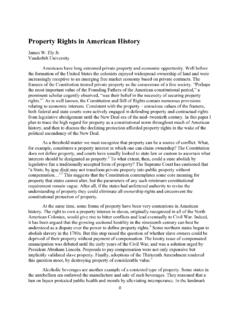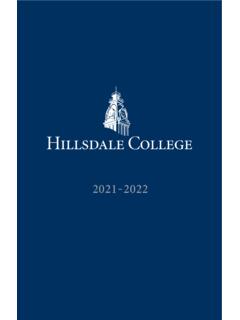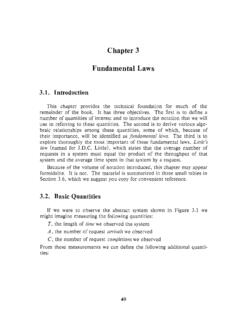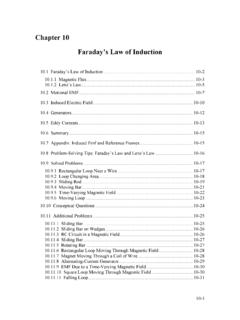Transcription of THE GROUND OF LOCKE’S LAW OF NATURE
1 THE GROUND OF LOCKE S LAW OF NATUREBy Thomas G. WestI. IntroductionWhat is the foundation of John Locke s political philosophy? This ques-tion is controversial among scholars, to be sure, but it is also relevant forpolitical life today. America s constitutional democracy was originallybased on Locke s political teaching, but few would say that his teachingis sufficient to sustain a sound constitutional democracy. Conservativessuch as Daniel Mahoney argue that the principle of American democ-racy is the [Lockean] liberty and equality of human beings, a principlethat has become in our time an unreflective dogma eroding the tradi-tions, authoritative institutions, and spiritual presuppositions that allowhuman beings to live free, civilized, and decent lives.
2 1 Liberals followthe claim of Progressive-Era intellectuals such as Herbert Croly, whoasserts that the Jeffersonian principle of individual rights has caused the inequalities of power generated in the American economic and polit-ical system. 2 Scholars and public intellectuals of all persuasions aretherefore constantly on the lookout for some non-Lockean doctrine as anadequate GROUND for political life in the twenty-first century. My essay ismeant to revive a willingness to examine Locke as if he might be right. Ido not commit the absurdity of claiming to have demonstrated the truthof Locke s teaching. But I will show that his theory is much more plau-sible than we have been led to contention here is that the foundation of Locke s moral and politicaltheory has long been misunderstood.
3 It provides a far more satisfactorybasis for political and moral life than has been acknowledged. Before wecan consider the question of whether Lockean political thought is worthyof being revived, however, we need to understand what his view is. Thepresent essay is meant to show that Locke s teaching on the law of natureis not based on divine revelation,3or a juridical doctrine of individual1 Daniel J. Mahoney,The Conservative Foundations of the Liberal Order: Defending Democracyagainst Its Modern Enemies and Immoderate Friends(Wilmington, DE: ISI Books, 2010), xiii, Croly,The Promise of American Life(1909) (Boston: Northeastern UniversityPress, 1989), is the position of Jeremy Waldron,God, Locke, and Equality: Christian Foundations inLocke s Political Thought(Cambridge: Cambridge University Press, 2002), 13.
4 Waldron doubtsthat one can even make sense of a position like Locke s .. [on] basic equality .. apartfrom the specifically biblical and Christian teaching that he associated with it. Later in thechapter I will show that Waldron is partly correct, although not because of Locke s 2012 Social Philosophy & Policy Foundation. Printed in the ,4or self-ownership,5or self-preservation,6or reasoning from prem-ises that are not rooted in the empirical will argue, on thecontrary, that the real GROUND of Locke s teaching is found in his under-standing of the conditions of human conclusion, however, is far from evident on the surface of Locke swritings. Locke draws his reader into an amazingly complex line of rea-soning, scattered up and down in several of his books, leading finally tothe real basis of his teaching on the law of NATURE .
5 Locke engages thereader in a dialogue, in which initially plausible arguments are put for-ward, then implicitly questioned, leading to new arguments, which againare questioned, and so on. Along the way, one s understanding of thesubject constantly deepens as one follows what Locke calls the long andsometimes intricate deductions of reason 8which are necessary to reachthe ultimate GROUND of the law of NATURE . Locke writes treatises, notPlatonic dialogues. But his treatises are written in such a way that thereader will have a hard time penetrating them if he does not followLocke slogoswherever it leads. Locke says that understanding the epistlesof St. Paul requires sober inquisitive readers who bring stubborn atten-tion, and more than common application to the same goes forreading Locke himself.
6 As we will see, a dialogical thread will take usfrom one of Locke s books to another, until we put together all the rele-vant passages to show the complete picture of his scholars agree that Locke s arguments for a law of NATURE areinsufficient. It is a fact, writes John Dunn, that such a demonstrationis not in principle possible and that the development of Locke s ideas haddrawn the difficulties of such an effort sharply to his attention. Dunnalso remarks, There is, however, little agreement among interpreters of4A. John Simmons,The Lockean Theory of Rights(Princeton: Princeton University Press,1992), 3, speaks of the theory of rights on which his philosophy rests. 5 Michael P.
7 Zuckert,Natural Rights and the New Republicanism(Princeton: Princeton Uni-versity Press, 1994), 285 86, argues that the foundation of Locke s doctrine of rights, whichis more fundamental than his doctrine of natural law, lies in the right of self-ownership. Iwill show that the law of NATURE is more fundamental than the self-ownership doctrine,although I agree with Zuckert that its origin is not transcendent. 6 Thomas L. Pangle,The Spirit of Modern Republicanism: The Moral Vision of the AmericanFounders and the Philosophy of Locke(Chicago: University of Chicago Press, 1988), esp. 198 C. Myers,Our Only Star and Compass: Locke and the Struggle for Political Rationality(Lanham, MD: Rowman & Littlefield, 1998), calls this the conventionalist position.
8 SeeEugene Miller, Locke on the Meaning of Political Language: The Teaching of theEssayConcerning Human Understanding, Political Science Reviewer9 (Fall 1979): 163 93; cf. LeoStrauss,Natural Right and History(Chicago: University of Chicago Press, 1953), 250 Locke,The Reasonableness of Christianity, As Delivered in the Scriptures(1695), C. Higgins-Biddle (Oxford: Clarendon Press, 1999), chap. 14, 266 (pagination of the firstedition, printed in the margin). The same pagination is found in the margin of the reprintof Higgins-Biddle sReasonablenessin John Locke,Writings on Religion,ed. Victor Nuovo(Oxford: Clarendon Press, 2002).9 Locke, The Preface: An Essay for the Understanding of St.
9 Paul s Epistles by Consult-ing St. Paul Himself, inA Paraphrase and Notes on the Epistles of St. Paul(1707), ed. ArthurW. Wainwright (Oxford: Clarendon Press, 1987), 1:107, G. WESTL ocke s thought on the significance that should be attached to these facts. 10 This is my point of begin with theSecond Treatise,because that is where most anyone reads theFirst Treatisetoday, and, as far as Ican tell, ever did. TheSecond Treatiseis where Locke lays out most ofthe political doctrines that he is famous for. At the beginning of chap-ter 2, Locke gives us two arguments that profess to explain how weknow that we are governed by the law of NATURE , and part of what thatlaw requires of , creatures of the same species and rank.
10 Born to all the sameadvantages of NATURE , and use of the same faculties, should also be equalone amongst another without subordination. 12 Second, being all equaland independent, no one ought to harm another in his life, health, liberty,or possessions: for men being all the workmanship of one omnipotentand infinitely wise maker, all the servants of one sovereign master, ..they are his property, whose workmanship they are, made to last duringhis, not one another s pleasure. 13In a word, Locke s first argumentappears to be that all human beings possess the same advantages ofnature, and the second is that we are all God s property and therefore wemay not harm each TheSecond TreatiseArgument from Equal TalentsThe first argument claims that creatures promiscuously born to all thesame advantages of NATURE , and the use of the same faculties have nonatural right to rule each other.












